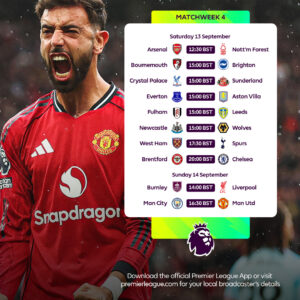South Africa and Nigeria shared the spoils in a tense and hard-fought CAF 2026 World Cup qualifier clash held at the Free State Stadium on Tuesday evening. The match ended in a 1-1 draw, a result that signifies a balance of power between the two footballing nations as they continue their respective campaigns in Group C. Both teams showed moments of skill and determination throughout the encounter, but ultimately neither side was able to secure a decisive victory.
South Africa, who entered the clash as group leaders, were the first team to make a breakthrough on the scoreboard. The opening goal came in an unexpected manner when Nigeria’s defender William Troost-Ekong inadvertently put the ball into his own net, giving Bafana Bafana a 1-0 on the 25th minutes, advantage midway through the first half. This early lead energized the South African side and their fans, as they looked to extend their dominance in the group.
However, Nigeria did not take long to respond to the setback. Demonstrating resilience and determination, the Super Eagles pressed forward, and just before the halftime whistle, their defender Calvin Bassey rose to the occasion by scoring a crucial equalizer on the 44th minutes. His goal leveled the match at 1-1, ensuring that Nigeria remained very much in contention and kept their hopes of advancing alive going into the second half of the game.
This draw leaves both South Africa and Nigeria with important work to do in their remaining fixtures if they hope to qualify for the coveted 2026 World Cup, as the competition in Group C remains fierce and unpredictable. Fans from both countries will be eager to see how their teams respond in the upcoming matches as they strive to advance on the continental and global stage.
The result means South Africa missed the chance to seal automatic qualification for the 2026 FIFA World Cup, while Nigeria remain under pressure in their quest for a direct ticket.
South Africa will need to secure at least one more positive result in their upcoming matches to officially confirm their qualification for the expanded 48-team 2026 FIFA World Cup. This means that the team must either win or draw one of their remaining games to accumulate enough points to guarantee their place in the tournament without depending on other teams’ outcomes.
On the other hand, Nigeria faces a more challenging path to the World Cup. They must deliver a strong finish in their remaining fixtures and may have to rely on being one of the best runners-up across all qualifying groups to advance. This scenario means that Nigeria not only needs to win their remaining matches but also must outperform other second-placed teams to secure qualification for the prestigious tournament in North America.
Talking Point
Victor Osimhen’s Absence: Nigeria’s star striker, Victor Osimhen, was unable to participate in the fixture due to a foot injury he had sustained during their previous qualifying match against Rwanda. This injury forced him to sit out the game, depriving the Super Eagles of their key attacking threat.
Known for his pace, skill, and goal-scoring ability, Osimhen’s absence was a significant blow to Nigeria’s offensive strategy, as the team struggled to find the same level of firepower and creativity in the final third without their talismanic forward. His unavailability undoubtedly impacted the team’s overall performance and effectiveness in the attacking phase throughout the match.
Group C Stakes: South Africa stay top of the group with 17 points, but their qualification is not yet secured. Nigeria’s draw keeps them in contention but complicates their path, with remaining fixtures now critical.
Lighthearted Moment: Before kickoff, a slip by Wilfred Ndidi in the players’ tunnel caused a brief pile-up with teammate Moses Simon, a moment that went viral on social media and eased some pre-match tension.
The draw underscores the high stakes in CAF qualification, with just a handful of matches left to determine which African giants secure their ticket to football’s biggest stage.







